So, you've decided to start a podcast. You've got an idea, recorded your first episodes, and now you need a home for that podcast. So what are the best podcast hosting platforms?
If you're looking for a platform that aligns with your vision while catering to your specific needs - whether you're a hobbyist, a professional, or somewhere in between - then you're in the right place.
In the ever-expanding world of podcasting, choosing the right hosting service can make all the difference in reaching your audience and growing your podcast. Let's tackle some questions and explore options to find the perfect home for your podcast.

Book Your Next Podcast Guest the Easy Way
With more than 70,000 members, MatchMaker.fm is the largest online community connecting podcasters & guests.
Join MatchMaker todayWhat Is a Podcast Hosting Platform?
Just like a website needs a web hosting site to be accessible online, your podcast needs a similar home after you hit "stop" on your recording. This is where a podcast hosting service comes into play.
It's the essential online spot where your podcast's audio files live, allowing your audience to find and listen to your episodes wherever they are. Without a hosting site, sharing your podcast would be like trying to invite people to a house that doesn’t have an address.
Why Do You Need a Podcast Hosting Platform?
Podcast hosting platforms not only store your content but they also distribute it to popular platforms, like Apple Podcasts and Spotify. They also track your listenership with analytics and help you monetise your show. Essentially, a podcast hosting platform provides your podcast's foundation to reach your audience effectively and grow.
What to Consider When Choosing Your Podcast Hosting Platform
Finding the right home for your podcast is crucial for its success. Here are some key factors to consider when picking the perfect podcast hosting platform.
1. Ease of Use
You want a platform that's easy to navigate, especially if you're just starting out. Look for a hosting site that makes uploading episodes, managing your content, and analysing your podcast's performance a breeze.
2. Reliable Storage & Bandwidth
Your podcast can't afford to be inaccessible because you've hit a storage limit, or because too many people are trying to listen at once. Choose a podcast hosting service that can scale with your podcast, offering ample storage for your episodes and enough bandwidth to handle your growing audience.
3. Distribution & Integration Capabilities
The best podcast hosting platforms do more than just store your episodes; they help you reach as many ears as possible. Look for podcast hosting solutions that offer easy distribution to major podcast directories like Apple Podcasts, Spotify, and Google Podcasts. Integration with social media platforms for effortless sharing can also boost your visibility.
4. Monetisation Opportunities
If you want to make money from your podcast, some podcast hosting sites offer built-in monetisation tools like sponsorships, ads, and subscription models. These can be a game-changer for turning your passion into a profitable venture.
5. Analytics
Understanding your audience is key to growing your podcast. Opt for a hosting service that provides detailed podcast analytics such as listener demographics, episode download figures, and engagement metrics. This data is invaluable for tailoring your content to what your audience loves most.
6. On-Hand Technical Support
A responsive and helpful customer support team can make all the difference, especially when you encounter technical issues or have questions about your account. A good podcast hosting platform should offer accessible support through email, phone, or live chat channels.
7. Price
Finally, consider your budget. While there are free podcast hosting options, they may have limitations compared to paid plans. Podcast hosts should evaluate the most important features and choose a plan that balances cost with your needed services and capabilities.
Free vs Paid Podcast Hosting Platforms
Speaking of a free plan, let’s touch quickly on free podcast hosting options versus paid ones. Many hosting platform sites cater to various podcasters by offering both free and paid plans, making it easier to find something that fits your needs and goals.
Free plans are a fantastic way to dip your toes into podcasting without making a financial commitment. They allow you to test the platform's interface, get a feel for podcasting logistics, and start building your audience without upfront costs. This particularly appeals to hobbyists or newcomers still exploring the medium and not ready to invest money.
However, even the best free podcast hosting platforms often come with their set of limitations. Storage space can be quite restricted, meaning you can only host a certain number of episodes or be limited in the length and quality of your audio files. Bandwidth limitations might also affect how many listeners can access your podcast simultaneously.
Also, free plans usually lack advanced features such as detailed analytics, monetisation options, and the ability to customise your podcast's branding and podcast website fully.
As your podcast grows and your ambitions expand, transitioning to a paid plan often becomes necessary. But if you’ve chosen the right podcast hosting platform, this can be as easy as just clicking a button and moving from a free plan to a paid one.
So now that we’ve answered all your burning questions, let’s look at some of the best hosting providers out there.
12 Great Podcast Hosting Platforms
Here’s the bit you’ve been waiting for. Below are 12 fantastic podcast hosting platforms. Again, do your research before making your final decision, especially if you’re opting for one on a pricing plan.
1. Podcast.co
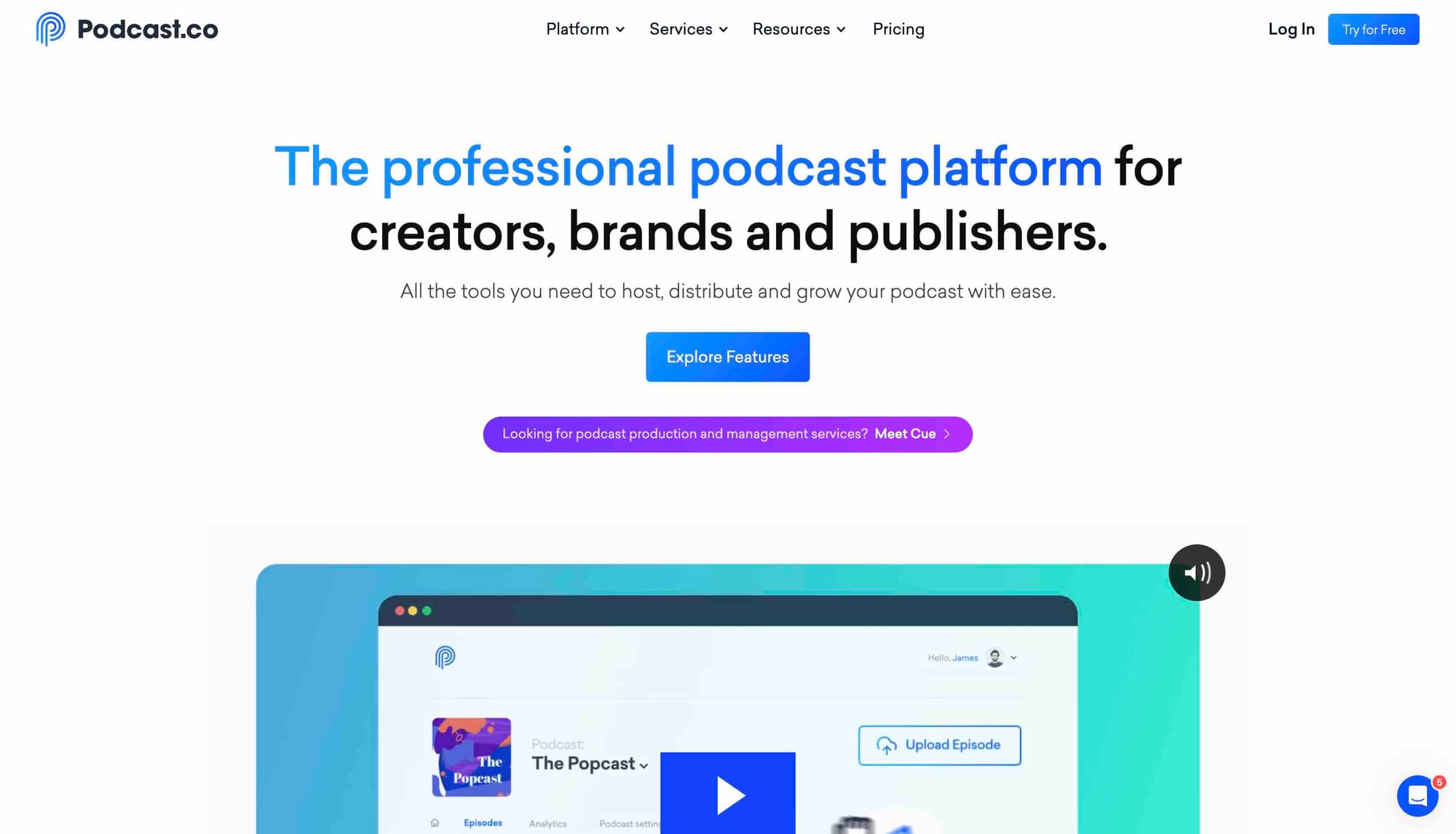
Throwing our own hat into the ring, Podcast.co is the professional podcast platform designed for creators, brands, and publishers. With an emphasis on simplicity and power, we provide all the necessary tools to host, distribute, and grow your podcast effortlessly.
Best Features:
- Intuitive interface for easy podcast management
- Global distribution to all major platforms
- Powerful analytics to track your podcast's growth
- Customisable podcast pages to match your brand, including host biographies
- Audiogram tool
- Intro & outro placement feature
Pros of Podcast.co:
- User-friendly platform suitable for podcasters at any level
- Offers unlimited hosting and bandwidth
- Lots of amazing growth-focused tools
- 14-day free trial for all plans
Cons of Podcast.co:
- Lacks a free hosting plan, focusing on premium services
- Advanced features may require higher-tier plans
Pricing: Podcast.co offers a straightforward pricing model starting at $19/month for our Lite plan, which is great for budding podcasters. We also offer Growth ($49/month) and Premium ($99/month) plans that offer additional features like advanced podcast pages and private subscribers.
2. Buzzsprout
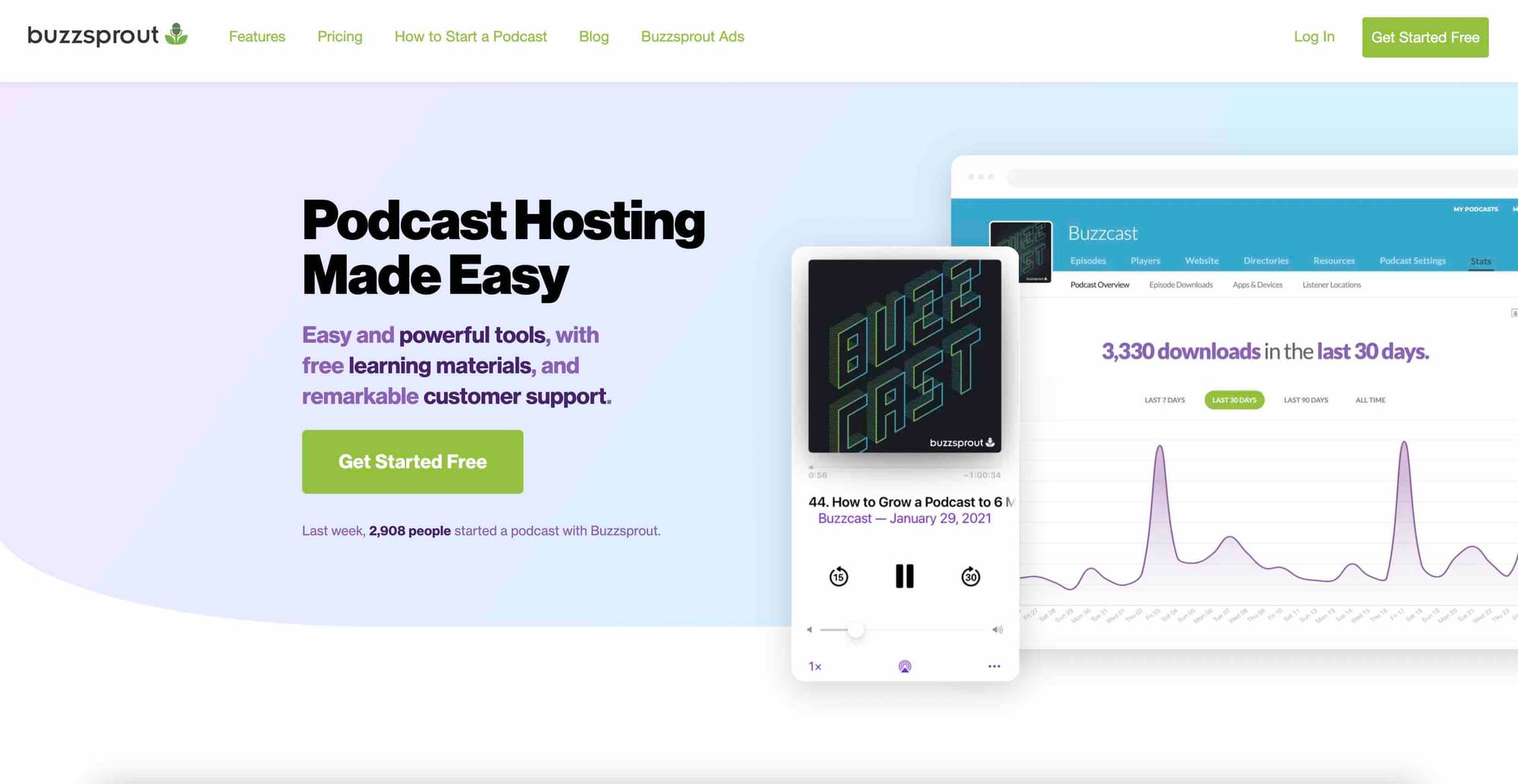
Buzzsprout has established itself as a favourite among podcasters since its launch in 2009, appealing to beginners and seasoned creators with its user-friendly interface and robust features. It's designed to make podcasting accessible, offering straightforward tools for quickly uploading, managing, and tracking podcasts.
Best Features:
- Automatic distribution to major platforms like Apple Podcasts and Spotify
- Advanced podcast statistics for insights into your audience
- Integrated monetisation options
- Episode optimisation for audio quality
- Chapter markers, which give listeners the ability to review content quickly
Pros of Buzzsprout:
- No annual contracts
- Intuitive dashboard and straightforward setup process
- Offers a wide range of educational resources to help podcasters grow their audience
Cons of Buzzsprout:
- The free plan includes ads, and episodes are hosted for only 90 days
- Advanced features and unlimited hosting require a paid plan
Pricing: If you want to create a Buzzsprout podcast, their free plan offers 2 hours of content per month for free, but they will be deleted after 90 days. For podcasters wanting to upgrade, paid plans start at $12 monthly for 3 hours of uploads and go up to $24 for 6 hours, with unlimited storage space. Each plan includes 250GB of monthly bandwidth for about 20,000 to 40,000 episode plays. Additional features like episode transcription and advanced statistics are available on higher-tier plans.
3. Spotify for Podcasters (Best Free Option)
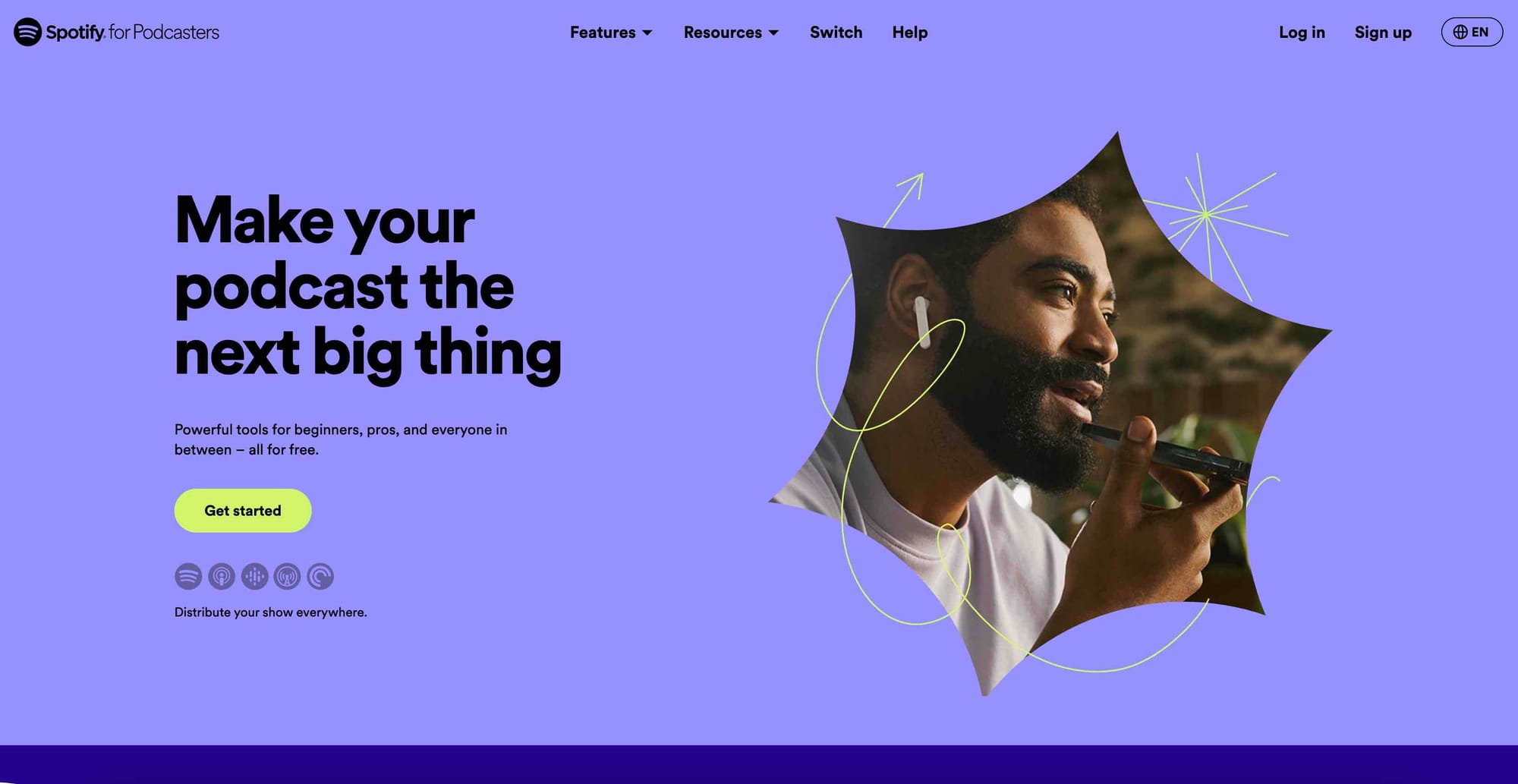
If you're looking for free podcast hosting platforms, look no further. Spotify for Podcasters, formerly Anchor, is a dynamic platform revolutionising free podcast hosting. It offers tools for recording, editing, distributing, and monetising podcasts, all within a user-friendly interface. This is hands-down one of the best podcast hosting free options.
Best Features:
- Free hosting with unlimited storage and bandwidth
- Direct integration with Spotify, offering immediate exposure to a wide audience
- Tools for creating and editing podcasts directly in the platform
- Monetisation options through Spotify’s advertising network
Pros of Spotify for Podcasters:
- Completely free to use, making it ideal for beginners and hobbyists
- Easy distribution on Spotify and other major platforms
- Intuitive recording and editing tools are accessible within the app
Cons of Spotify for Podcasters:
- Limited control over podcast distribution and analytics
- Some users desire more advanced editing features and customisation options
- 250MB audio file limit
Pricing: Spotify for Podcasters is free, providing a cost-effective solution for podcasters at all levels. It includes unlimited storage, direct distribution to Spotify, episode monetisation, and basic analytics without subscription fees.
4. Castos
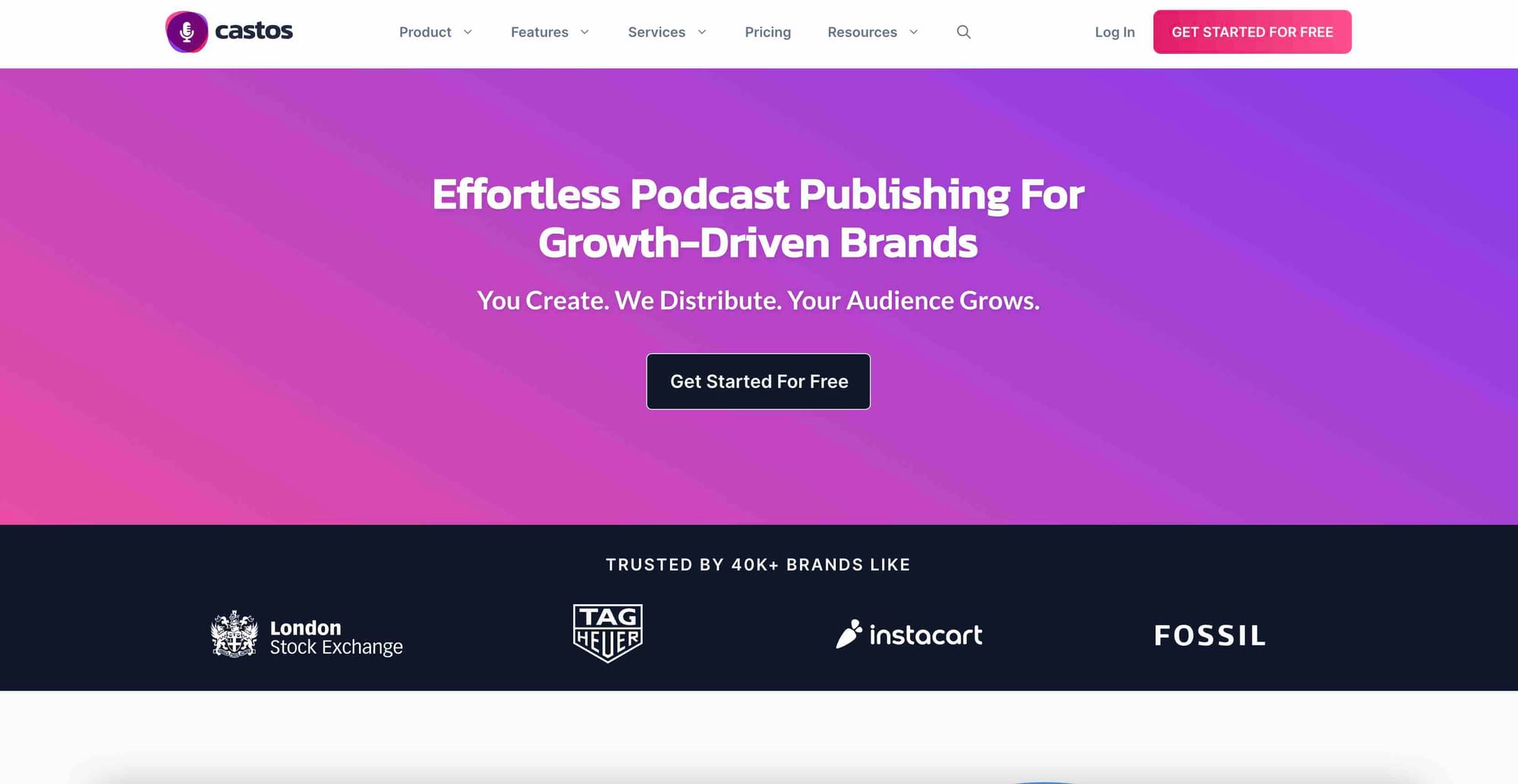
Castos is a versatile podcast hosting platform that prides itself on its simplicity and integration capabilities, especially with WordPress via its Seriously Simple Podcasting plugin. Launched to make podcasting seamless for creators of all levels, Castos offers an end-to-end solution for hosting, managing, and growing a podcast.
Best Features:
- Unlimited storage and bandwidth across all plans
- Direct integration with WordPress, allowing podcasters to manage their podcast directly from their website
- Detailed analytics to understand listener behaviour and podcast performance
- Automated transcription services for podcast episodes
Pros of Castos:
- No limits on storage or bandwidth
- Seamless integration and is easy to use, especially for those with WordPress sites
- Offers a 14-day free trial to test its features before committing to a plan
Cons of Castos:
- Pricing may be higher than some competitors, especially for podcasters just starting out
- The platform’s simplicity might lack some advanced features
Pricing: Castos offers a simple pricing structure with its Starter plan beginning at $19 per month - including unlimited storage, bandwidth, and basic analytics. The Growth plan at $49 per month adds advanced analytics, YouTube republishing, and automated transcriptions for up to 100 hours of audio. For larger operations, the Pro plan at $99 per month offers everything in the Growth plan plus video podcasting support and more.
5. Podbean
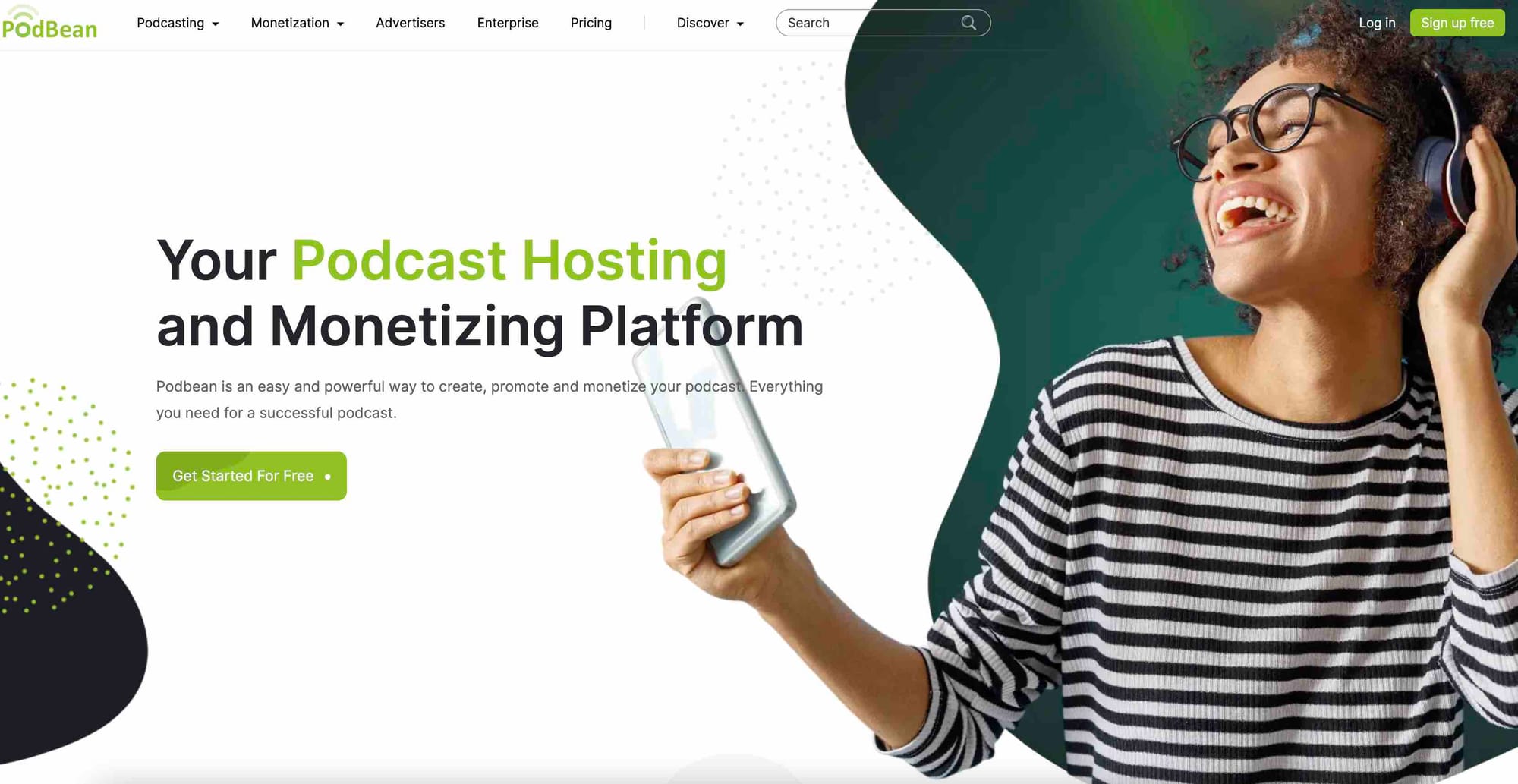
Since its inception, Podbean has grown into a community of over 600,000 creators, providing tools for recording, editing, and hosting podcasts. It's known for its monetisation platform, which allows creators to earn money from their shows through various channels.
Best Features:
- Direct distribution to major platforms like Apple Podcasts and Spotify
- Comprehensive podcast analytics to track audience engagement
- Live streaming capabilities to interact with the audience in real time
- A native patron feature for receiving listener support directly
Pros of Podbean:
- Offers a free plan with essential features for beginners
- User-friendly interface that's easy to navigate
- Robust monetisation tools, including a marketplace for ads
Cons of Podbean:
- Premium features require a paid plan
- Customisation options might be limited on free and lower-tier plans
Pricing: Podbean's free plan includes 5 hours of storage space, 100GB of monthly bandwidth, and basic analytics. Paid plans start at $9/month, offering unlimited storage and bandwidth, advanced design options, and access to the Podbean advertising marketplace. At $29/month, the Unlimited Plus plan adds features like the patron program, podcast themes, your own podcast site, and monetisation options.
6. Libsyn
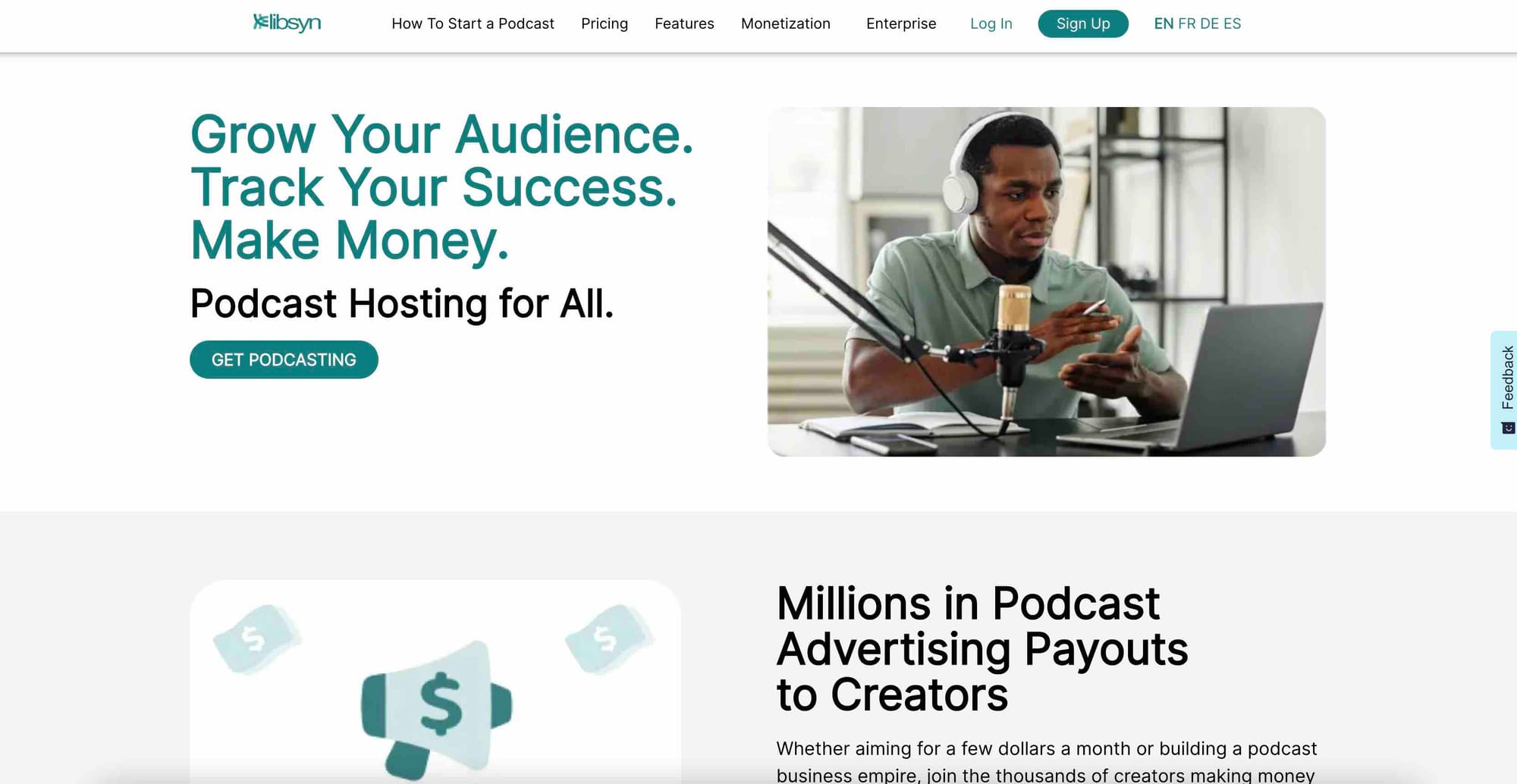
Libsyn is one of the pioneering podcast hosting services, established in 2004. It's revered for its stability, extensive distribution network, and commitment to helping podcasters at every level of their journey. Libsyn offers tailored solutions for content creators, businesses, and professional media producers.
Best Features:
- Wide distribution networks include Spotify, Apple Podcasts, and Google Podcasts
- Detailed analytics for tracking podcast performance
- Customisable podcast pages and a variety of monetisation options
- Advanced features for professional podcasters and businesses
Pros of Libsyn:
- Long-standing reputation for reliability and support
- Flexible pricing plans to suit different needs and budgets
- Comprehensive distribution and analytics capabilities
Cons of Libsyn:
- User interface feels dated compared to newer platforms
- Basic plan comes with limited storage and features
Pricing: Libsyn's pricing starts at $7/month with 162MB of monthly storage, suitable for new podcasters. Higher-tier plans, ranging from $15-20/month, offer increased storage, IAB-verified advanced stats, free website, and monetisation options.
7. Spreaker
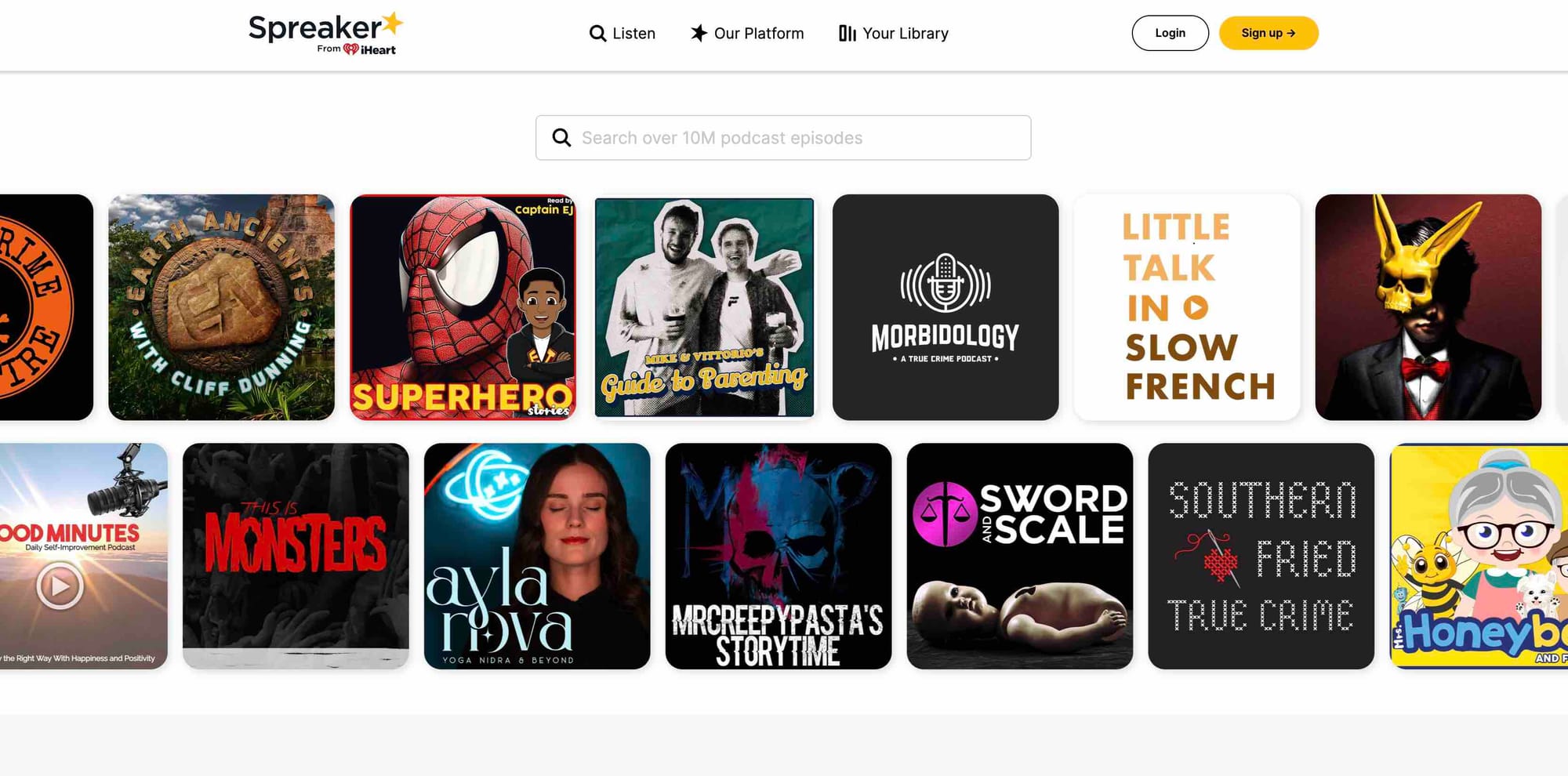
Spreaker is a podcast hosting platform that caters to creators of all levels - from hobbyists to professionals. It distinguishes itself with its live podcasting capabilities, integrated monetisation solutions, and comprehensive tools for recording, editing, and distributing podcasts. Acquired by iHeartMedia, Spreaker is part of a larger ecosystem to amplify podcast visibility and accessibility.
Best Features:
- Live podcasting to engage with audiences in real time
- One-click distribution to major listening platforms, including Apple Podcasts
- Integrated monetisation through advertising and listener donations
- Detailed analytics for tracking listener demographics and behaviour
- Spreaker Prime Network program that offers advanced podcasters (with over 10K US monthly downloads) with tailored free hosting and monetisation plan designed to earn creators more money
Pros of Spreaker:
- Flexible plans, including a free tier for beginners
- User-friendly interface for easy podcast management
- Offers a mobile app for podcasting on the go
Cons of Spreaker:
- Monetisation and advanced analytics features are limited to higher-tier plans
- Live broadcasting features may not be necessary for all podcasters
- Only email support, no phone or live customer support
Pricing: Spreaker provides a free option with 5 hours of audio storage and basic stats. Paid plans start with the Broadcaster plan at $20/month. From there, you have the Anchorman plan ($50/month) and the Publisher plan ($250/month), allowing larger podcasters and networks to sell and manage their ads directly.
8. Blubrry
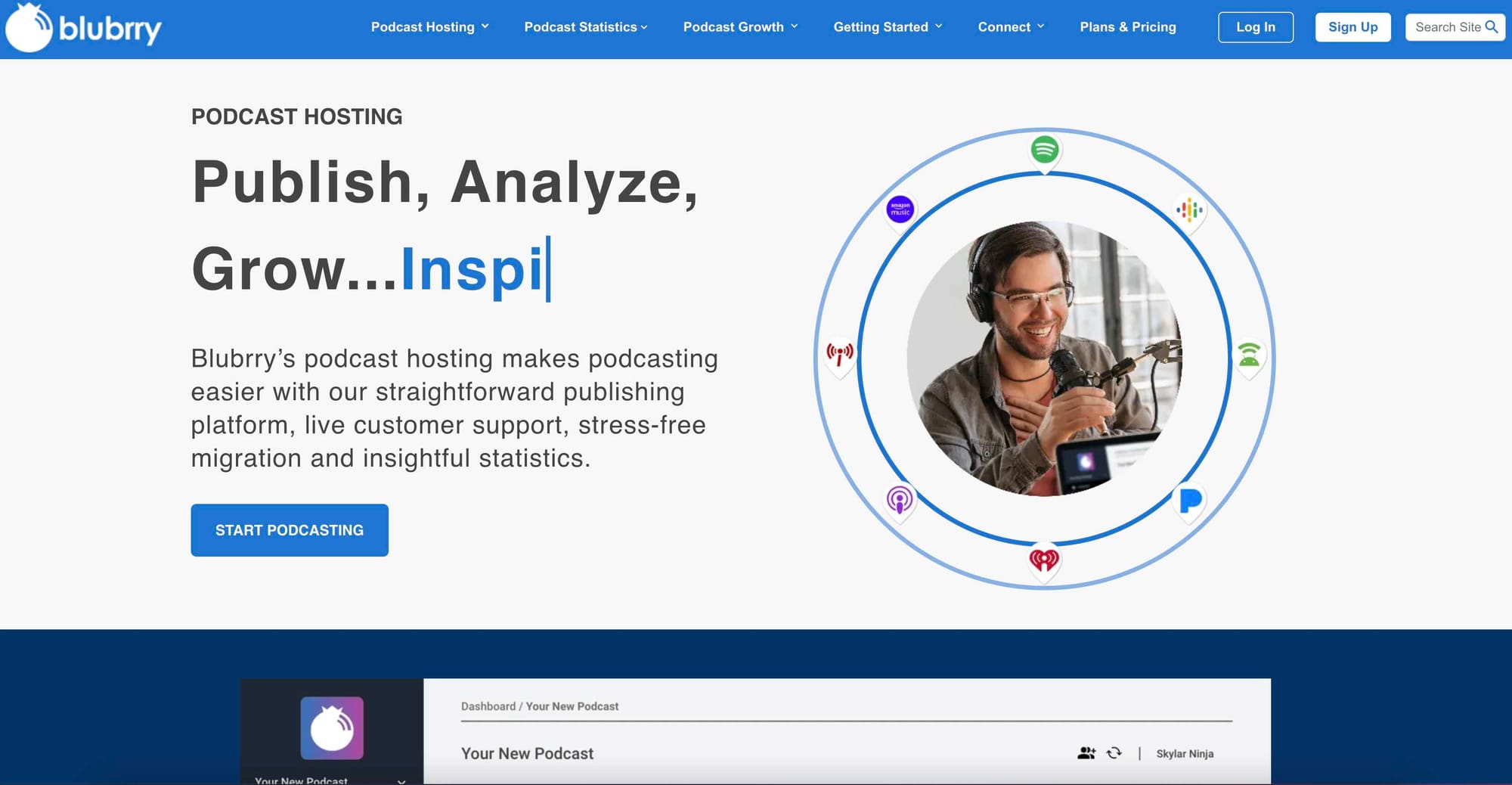
Blubrry is renowned for its deep integration with WordPress, facilitated by its PowerPress plugin, making it an attractive option for podcasters who manage their websites on WordPress. Launched in the mid-2000s, Blubrry emphasises creator freedom, offering comprehensive podcast hosting, distribution, and monetisation services.
Best Features:
- PowerPress plugin for WordPress, offering seamless podcast publishing directly from your website
- Detailed audience analytics complies with the Interactive Advertising Bureau (IAB) standards
- Offers Podcast Media Hosting and a Pro Production service for editing and production assistance
Pros of Blubrry:
- Robust WordPress integration for easy podcast management
- No-fault coverage allows for a buffer in storage limits, accommodating occasional spikes in podcast content without immediate plan upgrades
- Dedicated support team with personalised assistance
Cons of Blubrry:
- The interface and user experience may seem dated compared to newer platforms
- Pricing can be on the higher side for the level of storage and features offered
- There is no free plan
Pricing: Blubrry's pricing starts with a Small plan at $12/month, including 125MB of monthly storage, suitable for new podcasters. Plans scale up to $100/month for the Pro plan, offering 1TB of bandwidth, unlimited storage, and dynamic ad insertion.
9. Acast
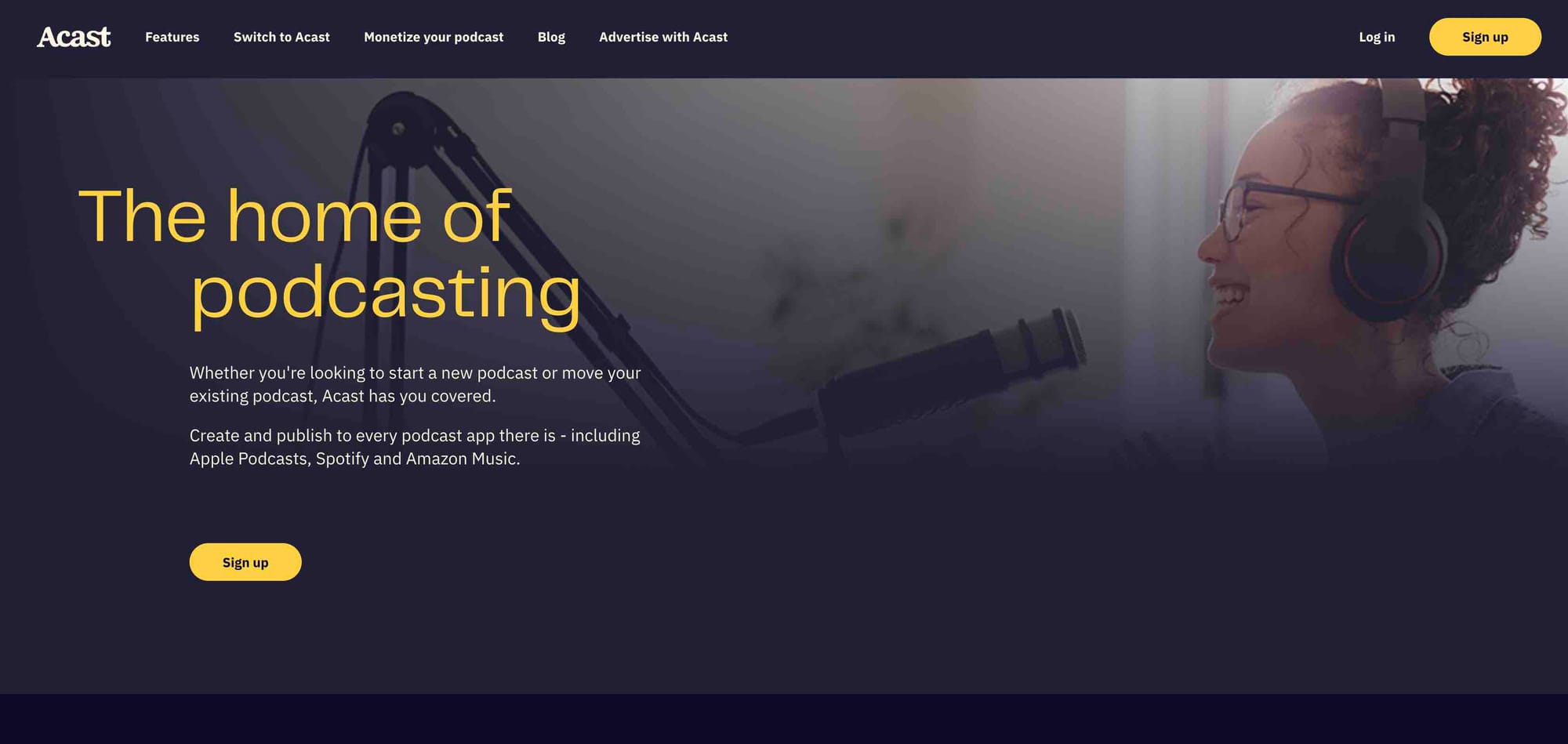
Acast is a global podcast hosting platform that caters to all podcasting levels, from independent creators to large publishers. Since its inception, Acast has been innovative in podcast monetisation, offering dynamic ad insertion, sponsorship opportunities, and a robust distribution network. They also offer snippets and an embeddable podcast player.
Best Features:
- Dynamic ad insertion technology for efficient monetisation
- Free access to Podcastle to edit podcasts
- Wide distribution capabilities, including all major podcast platforms
- Detailed analytics dashboard to track performance and listener engagement
- Offers tools for audience interaction, such as polls and Q&As within episodes
Pros of Acast:
- Strong focus on monetisation with flexible options for creators
- Comprehensive distribution network ensuring podcasts reach a wide audience
- Support for multiple languages and a global reach
- Preserves high-quality audio
Cons of Acast:
- Some advanced features and monetisation options are reserved for paid plans
- The platform's wide array of features can be overwhelming for beginners
- Each hosting account is limited to a single RSS feed link
Pricing: Acast offers a free tier with basic hosting and advanced podcast analytics. Acast also has the Influencer and Ace plan, which includes features like a headline audio-to-video tool, monetisation options, a podcast website, and a custom web player.
10. Transistor
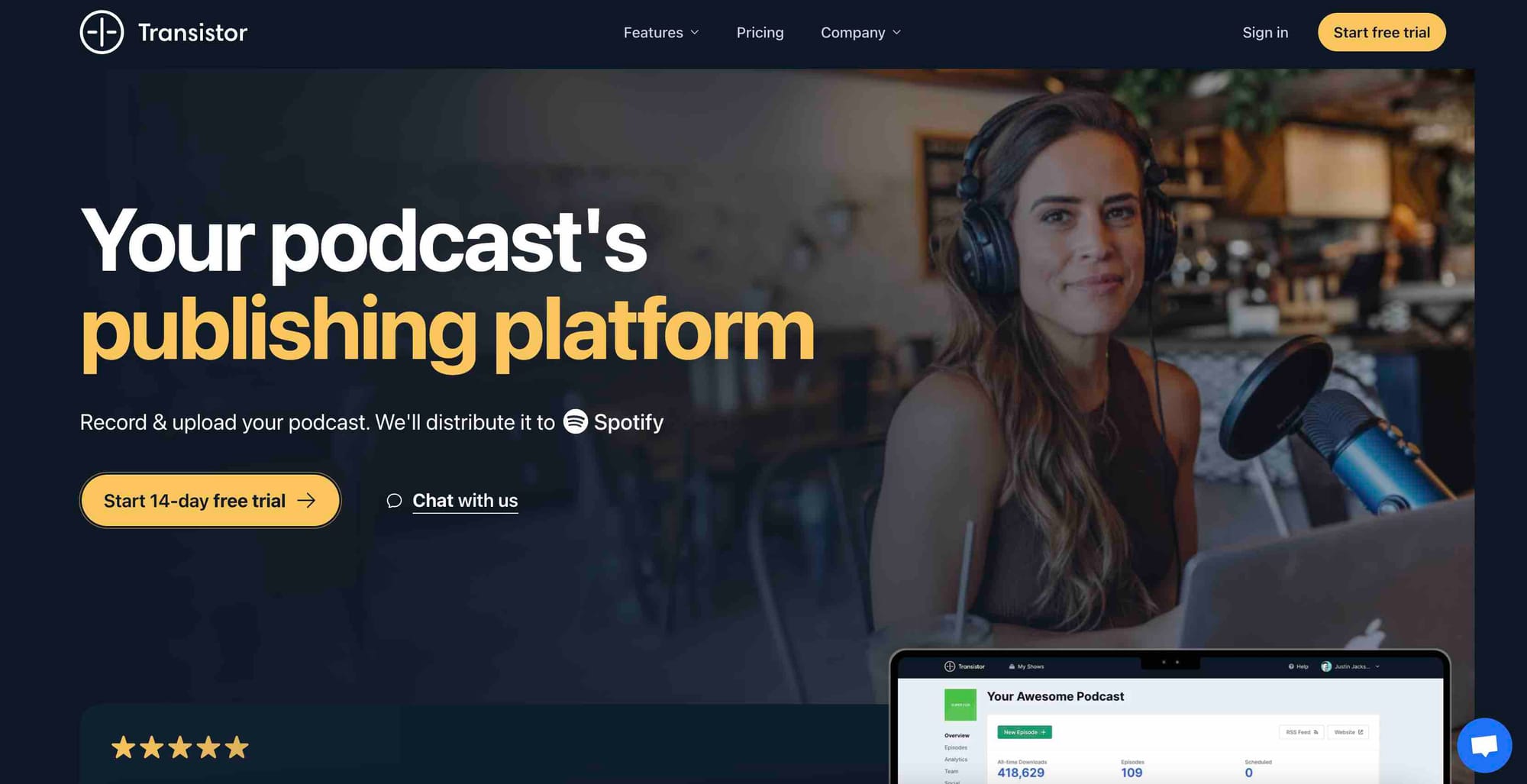
Transistor is a relatively newer player in the podcast hosting space, quickly gaining popularity for its sleek user interface, straightforward pricing, and robust feature set. It's designed for podcasters looking to grow their audience, offering unlimited podcasts and episodes across all plans.
Best Features:
- Unlimited podcasts and episodes on all plans
- Advanced analytics providing insights into listener demographics and episode performance
- Built-in support for hosting multiple co-hosts and guests
- Easy integration with major distribution platforms
Pros of Transistor:
- Simplified pricing structure with no caps on episode uploads or podcast projects
- Intuitive interface that’s easy to use for podcasters at any experience level
- Offers customisable podcast websites for each show
- Automatically able to post on YouTube
- Unlimited team members and collaborators
- Live customer support on all plans
Cons of Transistor:
- There is no free plan
- May lack some niche features found on platforms catering to professional studio setups
Pricing: Transistor pricing begins with the Starter plan at $19/month for up to 20,000 downloads each month, providing all essential features for new podcasters, including hosting, analytics, and distribution. They also have a Professional ($49/month) and Business ($99/month) plan.
11. Captivate
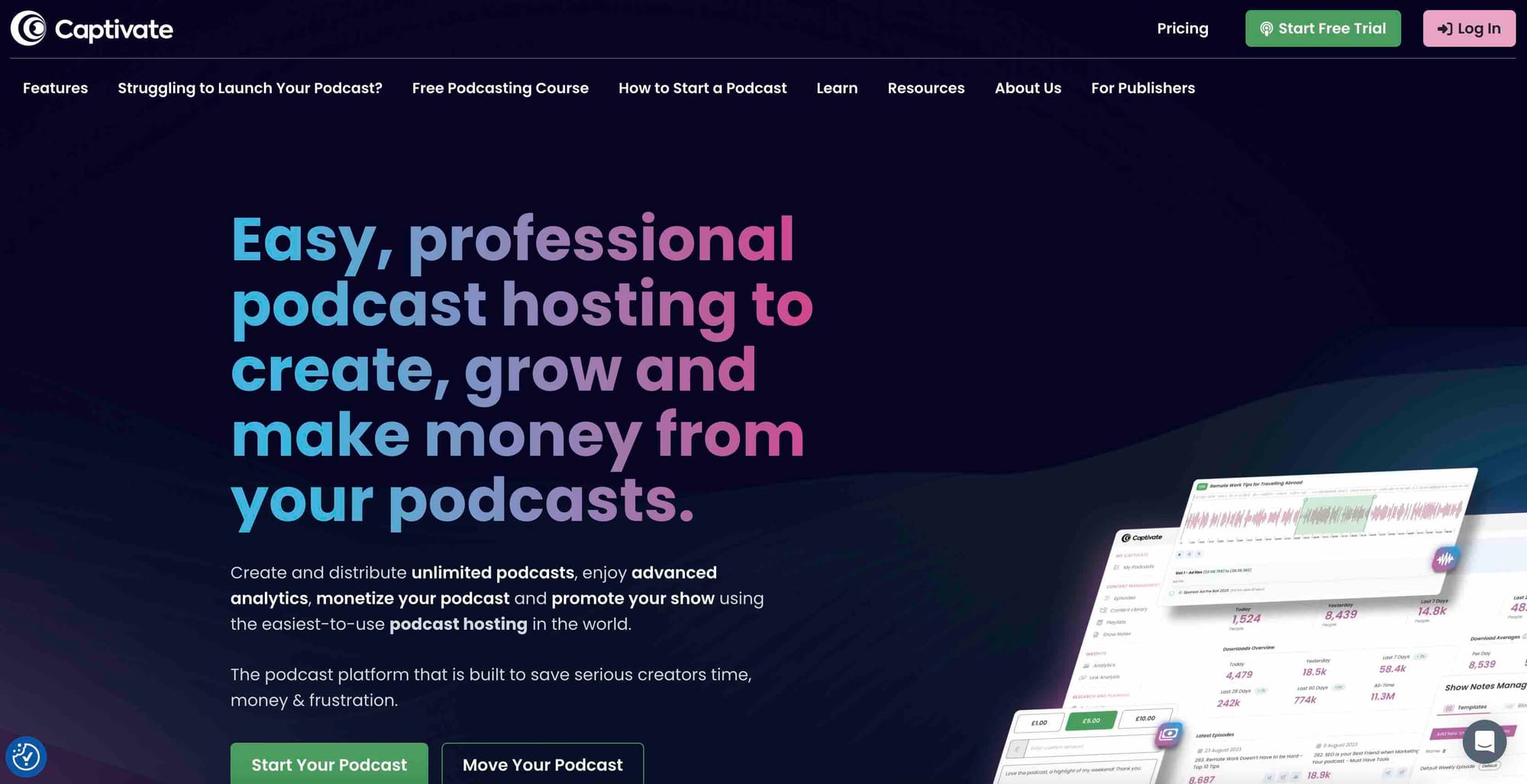
Captivate stands out in podcast hosting for its user-centric design, emphasising tools and analytics for podcast growth. Their motto is that they are the only growth-oriented podcast hosts out there.
Best Features:
- Call to actions in their podcast player
- Transcription feature
- Unlimited uploads and bandwidth
- Automated, customisable podcast sites that enhance online presence
- One-click sponsor kits
Pros of Captivate:
- Unlimited team members
- All plans offer unlimited hosting
- Free 7-day trial
Cons of Captivate:
- There is no free plan
- No native tools for monetisation
Pricing: Captivate structures its pricing around monthly download limits to accommodate podcasts at various stages of growth. The most cost-effective plan is $19/month for up to 30,000 monthly downloads.
12. Megaphone
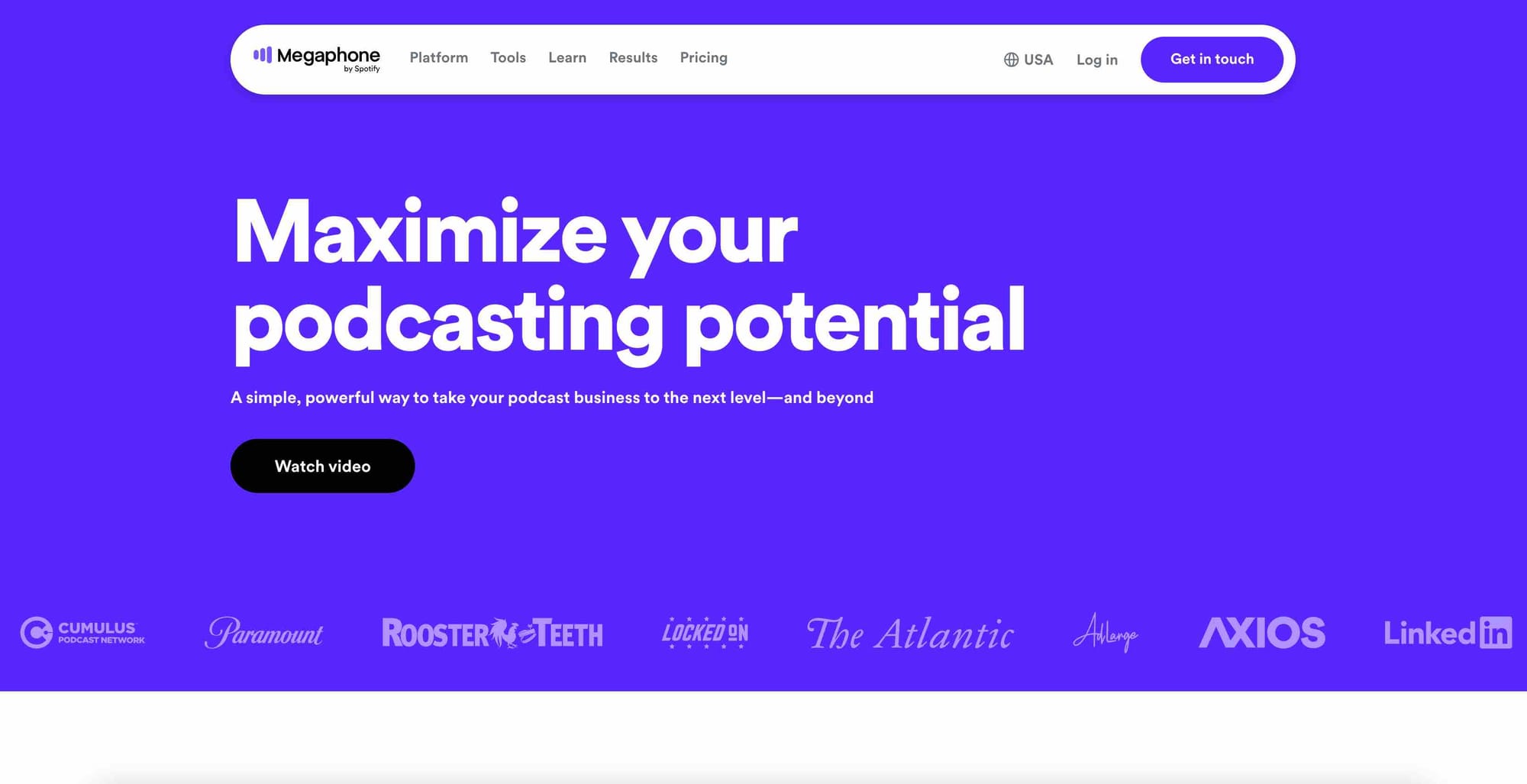
Megaphone is known for catering to larger publishers and podcast networks, focusing on advanced monetisation through targeted ad placements. It's a platform designed for podcasters leveraging their audience for scale revenue.
Best Features:
- Sophisticated ad targeting and insertion technology
- Robust analytics and audience insights
- Enterprise-level hosting and distribution capabilities
Pros of Megaphone:
- Powerful tools for monetisation and ad management
- Detailed listener analytics
- High-quality, reliable hosting for large-scale operations
Cons of Megaphone:
- Primarily geared towards larger, commercial podcasts
- Higher price point than many other platforms
Pricing: Megaphone operates on a custom pricing model tailored to the needs of larger publishers and networks. Interested parties must contact Megaphone directly for quotes, reflecting the platform's focus on enterprise-level services and advanced features.
So, What’s the Best Podcast Hosting Platform?
Embarking on your podcasting journey requires more than passion and content - it requires the right tools and platform. With the insights shared about the best podcast hosting platforms, you can make an informed decision that suits your unique needs.
Whether you're just starting out or looking to elevate your podcast to new heights, remember that the best podcast platform is the one that aligns with your goals, audience, and vision.

The #1 Podcasting Community
With more than 70,000 members, MatchMaker.fm is the largest online community connecting podcasters & guests.
Join MatchMaker today





